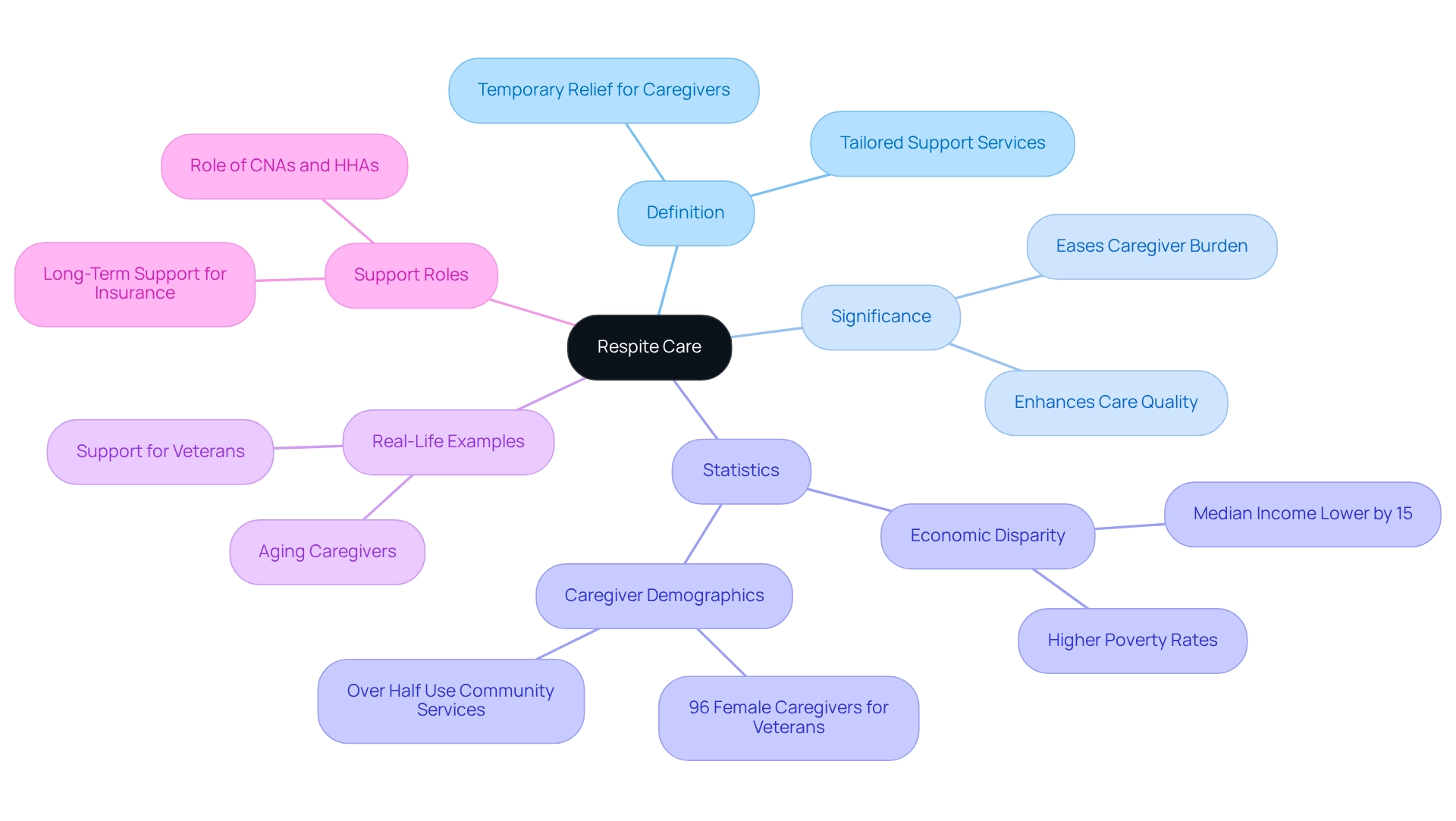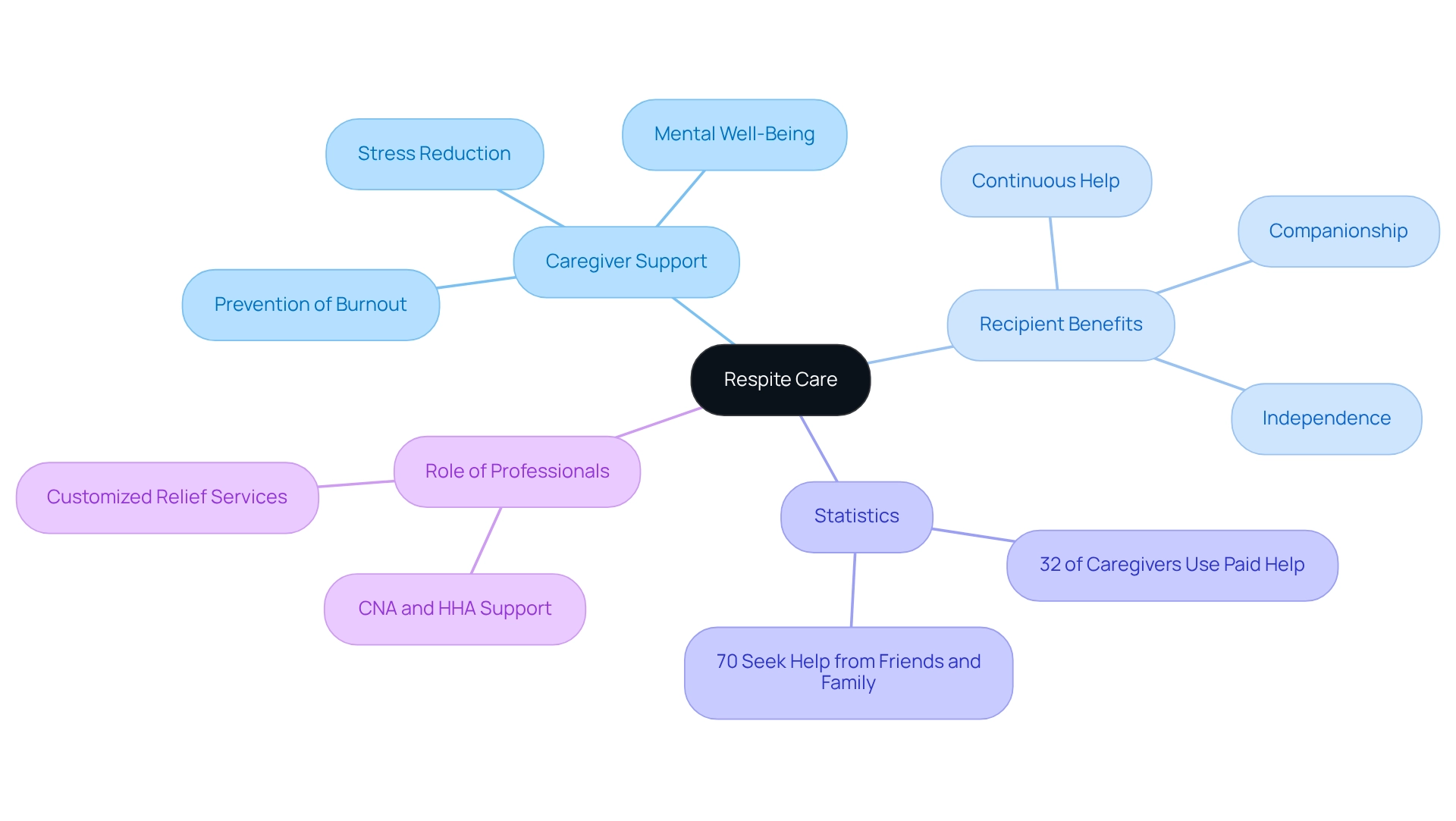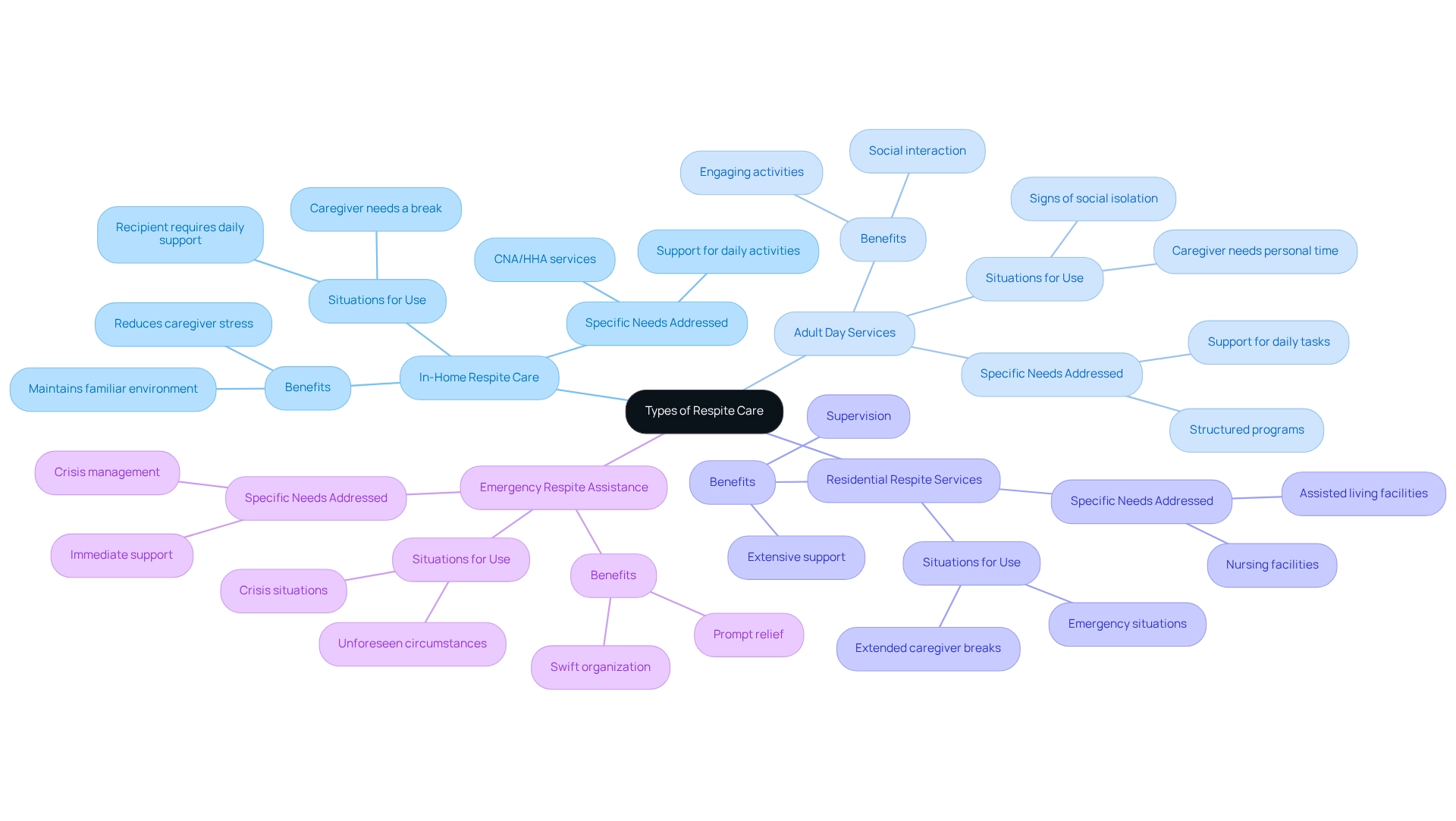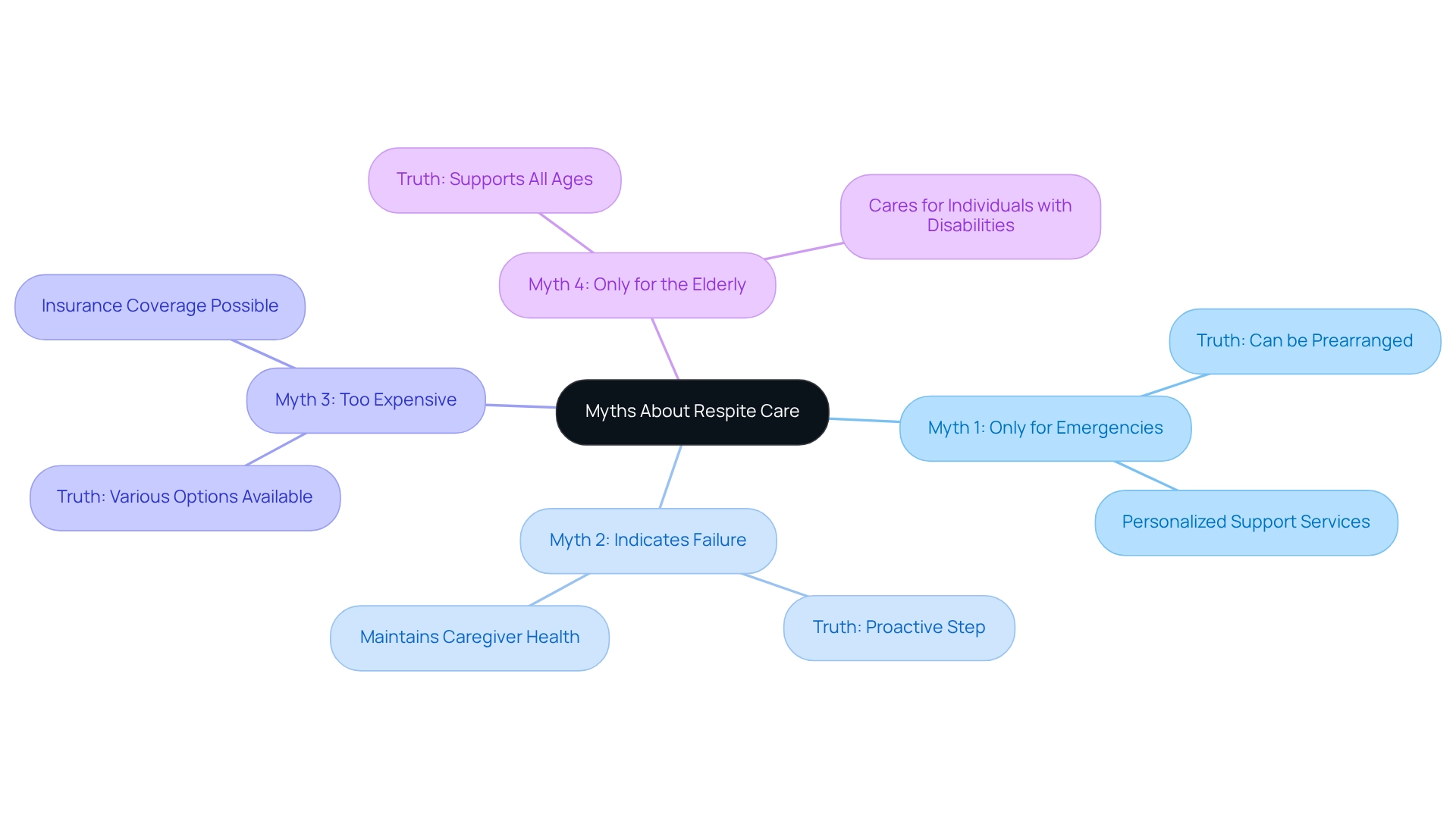Overview
Respite care serves as a vital support service, offering temporary relief for primary caregivers. This essential service allows caregivers to recharge, ensuring their loved ones receive the necessary care they deserve. It’s important to recognize how respite care alleviates caregiver stress and prevents burnout. By enhancing the quality of care for recipients, respite care truly makes a difference.
Imagine the peace of mind that comes from knowing your loved one is in capable hands while you take a moment for yourself. Statistics and real-life examples illustrate the positive impact of respite care, showcasing how it not only supports caregivers but also enriches the lives of those they care for. We’re here to help you navigate this journey, ensuring that both you and your loved ones find the care and support you need.
In addition, respite care fosters a nurturing environment that prioritizes the well-being of everyone involved. Your comfort is our priority, and we understand the challenges you face. By reaching out for respite care, you’re taking a crucial step towards maintaining your own health and happiness while providing the best for your loved ones. Let us support you in this journey, because you deserve the time to recharge and refocus.
Introduction
In the demanding world of caregiving, where physical and emotional burdens can weigh heavily, respite care emerges as a beacon of hope for both caregivers and their loved ones. This essential service provides temporary relief, allowing caregivers to step back, recharge, and ultimately enhance the quality of care they offer. As caregivers navigate the complexities of their roles, respite care not only alleviates stress but also fosters an environment where care recipients can thrive under the supervision of trained professionals.
Exploring the multifaceted nature of respite care reveals its profound impact on the well-being of caregivers and the individuals they support. By offering a moment of respite, we create space for caregivers to rejuvenate, ensuring that their compassion and dedication remain unwavering. Your comfort is our priority, and together, we can navigate the challenges of caregiving, making this journey a little lighter for everyone involved.
Define Respite Care: Understanding Its Core Meaning
The concept of respite care meaning includes essential short-term assistance designed to offer temporary relief for primary caregivers, allowing them the necessary breaks from their daily responsibilities. At Best Care Nurses Registry, we offer tailored relief support services that adapt to the unique needs of caregivers and individuals of all ages. This ensures that loved ones continue to receive the vital care and attention they deserve during the caregiver’s absence. Our assistance can be delivered in various settings, including the home, adult day programs, or residential facilities. The primary goal of this temporary support is to alleviate the pressure and physical demands placed on caregivers, enabling them to recharge and maintain their own health.
Temporary support can range from just a few hours to several weeks, depending on the needs of both the caregiver and the individual receiving support. The significance of respite care meaning is underscored by statistics revealing that many caregivers face overwhelming responsibilities. For instance, more than half of caregivers in rural areas rely on community-based services to effectively manage their duties. Additionally, the economic challenges faced by families with disabled members highlight the necessity of such support; families with a disabled member often experience median incomes more than 15% lower than those without disabilities, leading to higher poverty rates. This economic disparity emphasizes the importance of relief support in easing some of these burdens.
Real-life examples illustrate how relief services can significantly enhance the well-being of caregivers. For instance, supporters of veterans, predominantly women (96%), often assist their spouses or partners, facing unique challenges that short-term relief services can help mitigate. Moreover, as noted by the Administration on Aging, many individuals caring for older adults are themselves aging, complicating their support roles. By providing a much-needed break, the respite care meaning not only supports the mental and physical well-being of caregivers but also enhances the quality of care provided to their loved ones. CNAs and HHAs are crucial in this process, assisting with daily living activities and ensuring that caregivers remain informed about their loved ones’ conditions. Best Care Nurses Registry also offers long-term support for insurance, helping families navigate their policies and maximize their benefits. Ultimately, relief services serve as a vital support system, allowing caregivers to fulfill their responsibilities while prioritizing their own health and wellness.

Contextualize Respite Care: Importance for Caregivers and Recipients
The concept of respite care meaning encompasses a vital service within the caregiving network, offering necessary breaks that assist providers in preventing burnout, reducing stress, and improving their mental well-being. This short-term assistance is designed for individuals with disabilities or long-term illnesses, allowing primary caregivers to take essential time away while ensuring their loved ones receive regular help from trained professionals, such as CNA and HHA workers.
Many caregivers who reside with their recipients encounter a greater number of responsibilities, leading to significant physical fatigue and emotional stress. By providing temporary relief, support services embody the concept of respite care meaning, enabling those who assist others to rejuvenate and ultimately maintain their ability to deliver high-quality care. In fact, studies reveal that 32% of individuals providing support utilize paid assistance, highlighting the growing recognition of the need for professional aid to alleviate caregiver fatigue.
For those receiving assistance, temporary relief services not only ensure continuous help but also promote companionship, positively impacting their overall welfare. The involvement of CNA and HHA assistants is particularly beneficial, as they offer tailored support that addresses the unique needs of seniors, helping them maintain their independence and dignity. This dual focus on supporting caregivers and enhancing the well-being of recipients underscores the essential role of respite care meaning in fostering a healthy caregiving dynamic. However, without CNA/HHA support services, seniors may face various challenges, including health deterioration due to insufficient medical oversight, poor nutrition from inadequate meal preparation, and increased social isolation, which can lead to depression and anxiety. These issues highlight the critical importance of respite care meaning in ensuring that both providers and recipients receive the help they need, as case studies illustrate the significant impact of relief services. For instance, one study on caregiver coping strategies found that many individuals resort to unhealthy methods, such as alcohol or medication, to manage stress. This emphasizes the necessity for effective support systems that encourage healthier coping strategies. By prioritizing relief support as a healthier alternative, families can improve the mental well-being of caregivers while enhancing the quality of life for those receiving assistance. This makes temporary assistance a crucial component of comprehensive caregiving approaches in 2025.
Furthermore, the reliance on external resources is evident, as 70% of caregivers seek help from friends and family for information, assistance, or guidance, compared to 54% of those not involved in caregiving. This further underscores the significance of relief services as a professional support option that can alleviate the strain on informal helpers, ensuring that both supporters and recipients receive the necessary aid. Moreover, relief services can be customized to meet the individual needs of both caregivers and recipients, making it a versatile choice for families seeking support.

Explore Types of Respite Care: Options for Different Needs
The term respite care meaning encompasses several types, each tailored to meet the specific needs of caregivers and their loved ones.
- In-Home Respite Care: This option allows caregivers to hire professionals who provide care in the home, enabling the primary caregiver to take a much-needed break while their loved one remains in a familiar environment. Research indicates that even a small amount of four hours of relief support each week can greatly reduce stress for those providing assistance. Authentic success narratives emphasize how families have gained from this service, allowing caregivers to rejuvenate while ensuring their loved ones receive quality support. It’s essential to assess if your loved one requires CNA/HHA services, especially if they struggle with daily activities or have health concerns that necessitate ongoing support.
- Adult Day Services: These facilities offer structured programs during the day, providing social interaction and engaging activities for recipients. This not only enhances the lives of those being supported but also provides those who assist with essential time to handle personal obligations. Observing signs of social isolation or difficulty with daily tasks can indicate the need for such services.
- Residential Respite Services: This entails brief stays in assisted living or nursing facilities, where recipients receive extensive support and supervision. This option is especially advantageous for caregivers who require extended breaks or during emergencies. Consistent interaction with support providers and organizations can ensure that the standard of assistance remains elevated during these transitions.
- Emergency Respite Assistance: Created for unforeseen circumstances, this form of support can be organized swiftly to offer prompt relief for those providing assistance during crises. Understanding the respite care meaning can assist families in efficiently managing these pressing needs.
Every variety of temporary support addresses unique requirements, enabling providers to choose the most appropriate option according to their situations and the wishes of their family members. Raising awareness of these resources, as highlighted in the case study on community resources for temporary relief, can significantly improve the assistance available to family caregivers, ultimately enhancing their quality of life and that of their recipients. As Maya Angelou wisely stated, “They may forget what you said, but they will never forget how you made them feel,” emphasizing the profound influence of compassionate support.

Debunk Myths: Clarifying Misconceptions About Respite Care
Despite its numerous benefits, several myths about respite care continue to circulate:
- Myth 1: Respite care is only for emergencies. In truth, relief services can be arranged beforehand, allowing those who provide support to schedule regular intervals and prioritize their wellness. Best Care Nurses Registry offers adaptable support services that can be personalized to meet the unique needs of caregivers and their family members, including skilled nurse visits tailored to individual health requirements.
- Myth 2: Utilizing temporary support indicates I am not succeeding as a provider. On the contrary, seeking respite services is a proactive step that helps caregivers maintain their health and effectiveness. Our customized home health services, including skilled nurse visits for seniors and baby nurse support for new parents, are designed to provide essential assistance.
- Myth 3: Respite assistance is too expensive. A variety of options are available at different price points, with many potentially covered by long-term assistance insurance or government programs, making it more accessible than often perceived. Best Support Nurses Registry can help providers understand their insurance policies and maximize their benefits, ensuring they can effectively utilize their long-term assistance insurance.
- Myth 4: Respite care meaning suggests that only elderly individuals require respite assistance. Respite support is crucial for those who assist individuals of all ages, including those with disabilities or chronic health conditions. Our services cater to a diverse range of patients, ensuring that all caregivers receive the support they need.
Addressing these misunderstandings is vital, as a recent survey revealed that around 40% of caregivers utilize services that embody respite care meaning, highlighting its importance in managing caregiving responsibilities. For instance, nearly 60 million Americans live in multigenerational households, which can complicate caregiving dynamics but also provide additional support. As Mia Evans shared, “I never considered the fact that supportive services would accommodate a wide variety of patients from children to the elderly.” She reflected, “We need such services for our grandmother, who has many underlying issues and memory problems now.”
By dispelling these misconceptions, caregivers can feel more empowered to pursue relief services, ultimately enhancing their well-being and the quality of care they provide. Additionally, resources like The CareSide can assist caregivers in finding respite care meaning and navigating government programs, further supporting their needs. To discuss your specific needs and how we can assist, please call (888) 203-2529.

Conclusion
Respite care stands as a vital support system for both caregivers and their loved ones, addressing the myriad challenges faced in the demanding world of caregiving. By providing temporary relief, respite care allows caregivers to recharge, significantly reducing the risk of burnout and enhancing their overall well-being. With options ranging from in-home services to adult day care and emergency respite, families can tailor care to meet their unique needs, ensuring that both caregivers and care recipients receive the necessary support.
The importance of dispelling myths surrounding respite care cannot be overstated. Understanding that this service is not merely a last resort but a proactive measure can empower caregivers to seek out the assistance they need without guilt or hesitation. By recognizing that respite care is accessible and beneficial for individuals of all ages and circumstances, caregivers can make informed decisions that foster healthier caregiving dynamics.
As the landscape of caregiving continues to evolve, the significance of respite care remains clear. It not only alleviates the burdens on caregivers but also enhances the quality of life for those receiving care. Prioritizing these services ultimately creates a healthier environment for all involved, reinforcing the notion that taking care of oneself is essential in providing the best possible care to others. Embracing respite care is a crucial step towards sustaining compassion and dedication in the caregiving journey.
Frequently Asked Questions
What is the meaning of respite care?
Respite care refers to short-term assistance designed to provide temporary relief for primary caregivers, allowing them necessary breaks from their daily responsibilities while ensuring that their loved ones continue to receive vital care.
What services does Best Care Nurses Registry offer for respite care?
Best Care Nurses Registry offers tailored relief support services that adapt to the unique needs of caregivers and individuals of all ages, delivered in various settings such as homes, adult day programs, or residential facilities.
How long can respite care support last?
Temporary support can range from just a few hours to several weeks, depending on the needs of both the caregiver and the individual receiving support.
Why is respite care important for caregivers?
Respite care alleviates the pressure and physical demands placed on caregivers, enabling them to recharge and maintain their own health, which ultimately enhances the quality of care provided to their loved ones.
What challenges do caregivers face that make respite care necessary?
Many caregivers face overwhelming responsibilities, especially in rural areas where over half rely on community-based services. Economic challenges also play a role, as families with disabled members often experience lower median incomes and higher poverty rates.
Who benefits from respite care services?
Caregivers, including those supporting veterans and aging individuals, benefit significantly from respite care services, as they provide much-needed breaks that support their mental and physical well-being.
How do CNAs and HHAs contribute to respite care?
Certified Nursing Assistants (CNAs) and Home Health Aides (HHAs) assist with daily living activities and ensure that caregivers remain informed about their loved ones’ conditions during the respite period.
Does Best Care Nurses Registry provide long-term support for caregivers?
Yes, Best Care Nurses Registry offers long-term support for insurance, helping families navigate their policies and maximize their benefits.











